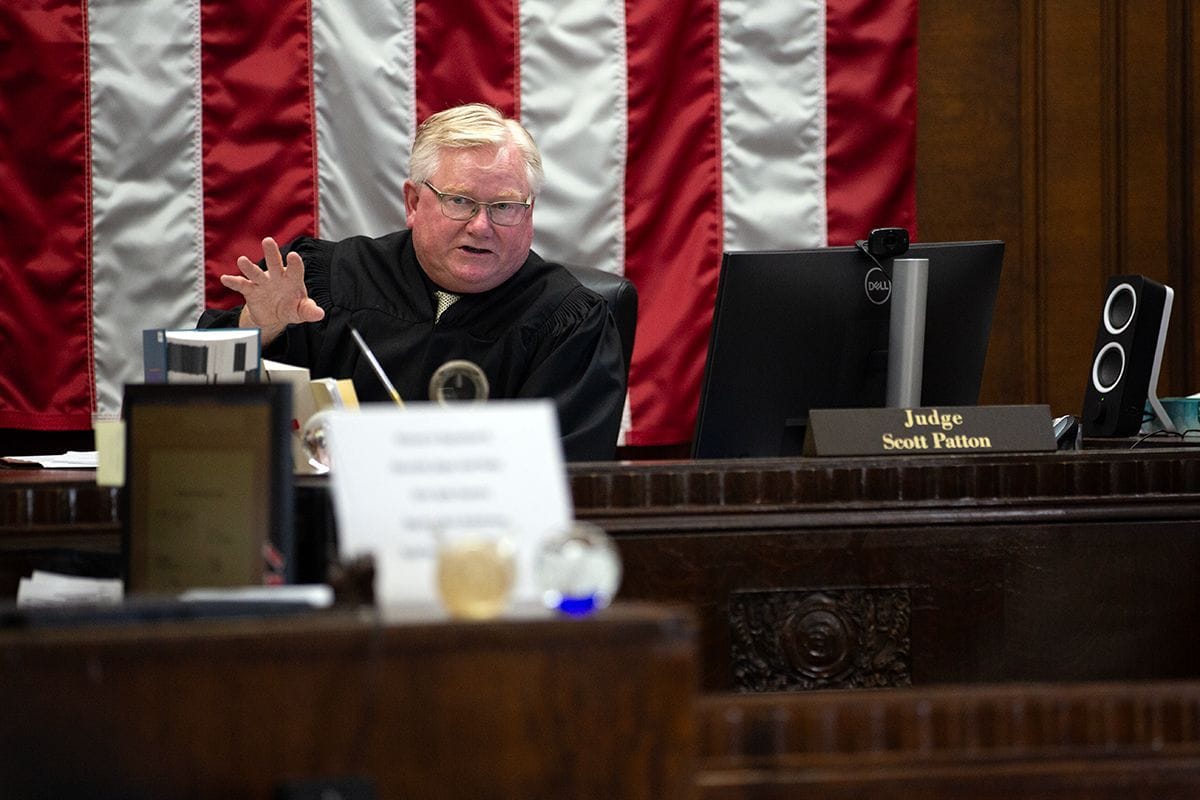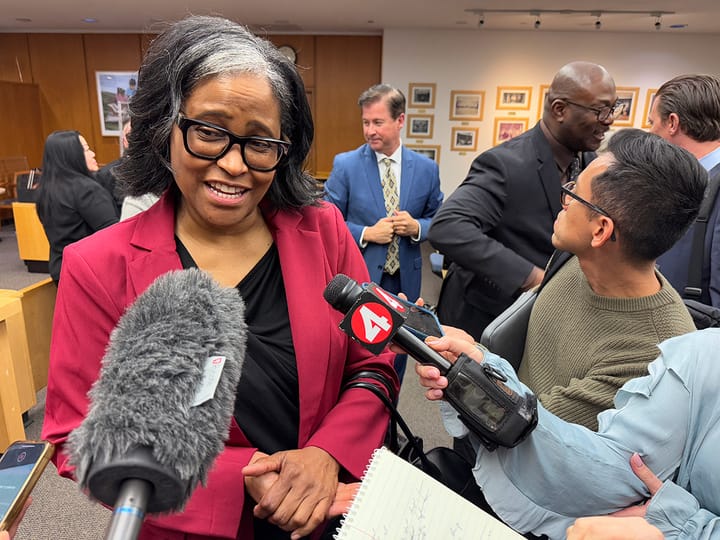'Fatal error' by DA's office may see manslaughter case dropped against Alameda cops
Judge Scott Patton asked pointed questions of the prosecution and said he would issue his ruling on the Mario Gonzalez case by Oct. 11.

Attorneys for three officers charged with the death of Mario Gonzalez say the case must be dismissed because prosecutors failed to get arrest warrants.
DA Pamela Price charged the officers with involuntary manslaughter in April after an expert she hired ruled that they had kept Gonzalez in "a prone position for an extended period," causing him to suffocate during a seven-minute interaction on April 19, 2021.
A review by the prior district attorney, Nancy O'Malley, found that the evidence did "not justify criminal charges" against Alameda police officers Cameron Leahy, James Fisher and Eric McKinley.
The initial autopsy found that Gonzalez, 26, had died due to the "toxic effects of methamphetamine" with contributing factors listed as stress related to restraint, morbid obesity and alcoholism.
After DA Price took office in January 2023, she hired a new expert to review the case as part of a broader review of in-custody deaths and officer-involved shootings.
The new expert determined that, while it had been appropriate for the officers to handcuff Gonzalez, keeping him face down on the ground in handcuffs for so long — three minutes and twenty-five seconds — was "unreasonable, excessive, and contrary to generally accepted police practices."
The DA's office filed involuntary manslaughter charges against the officers on April 18, a day before the three-year deadline.
Read more about Pamela Price on The Scanner.
In recent weeks, the defense has argued that prosecutors didn't follow all the rules, failing to secure arrest warrants.
The attorneys called it a "fatal error" that warrants dismissal of the case.
"Rather than perform the prosecutor's job of serving the justice system faithfully, the opposition filed here reveals that the District Attorney of Alameda County appears to be so personally intent on prosecuting police officers that she will not only disregard the well-reasoned conclusions of her predecessor but also openly flaunt the very rules established by the California Legislature that govern felony prosecutions," defense attorneys argued in a recent motion.
The prosecution said it followed "longstanding procedure" and that the officers had sufficient notice of the charges filed against them.
Judge: Why wait so long to file Mario Gonzalez case?
During a brief hearing Friday morning, Judge Scott Patton asked pointed questions of Deputy District Attorney Simone Spector about how the DA's office had approached the case and why it had waited so long to file charges.
"Why wait to the day before the statute of limitations?" Patton asked her. "And this goes to a prosecutor upholding the highest ethical standards and pursuing justice, not pursuing individuals."
The judge pointed out that the expert's "opinion letter" about the Gonzalez case had been dated Feb. 17 — well before the April filing deadline.
Spector answered that she had only just been hired when the case came up and said the office had been working to get the "final version" of the report before seeking charges.
"It's unfortunate that it took as long as it did," Spector said, adding, "There are other procedural reasons within our office why we couldn't proceed earlier, but I don't think they belong in this court today."
Patton also grilled Spector about why she had relied, in her brief, on a case from a different area, which was therefore "not binding … in any way" in Alameda County.
He said the case she referenced was a misdemeanor rather than a felony, and hence had different rules to follow, and "does not deal with the statute of limitations issue."
The "case does not seem to have any precedential value," Patton said. "So I'm curious as to why so much of your brief relies on that."
Spector told the judge she had felt that case "was persuasive," especially because she hadn't found much other case law "that reflects our particular fact pattern."
In her motion, Spector argued that the documents the DA's office filed had been sufficient to meet the legal standard.
"We recognize that this is not an arrest warrant, but … all of these documents together show that there's probable cause," she told Patton. "In retrospect, it would have been more expedious [sic] to ask for an arrest warrant. However, it didn't happen, and here we are today."
The judge observed that Spector's motion had largely focused on the issue of whether the defendants had proper notice of the charges against them.
"That's not really what the statute of limitations [is] about," Patton said. "It is whether the case proceeded, the criminal process proceeded, within the statute of limitations — which means it has commenced."
Read more court coverage on The Scanner.
Patton then turned to the defense — which he said had the burden of proof in cases like this.
Alison Berry Wilkinson, representing Cameron Leahy, kept her remarks brief.
She said the California penal code requires an arrest warrant when felony charges are filed: "The prosecution did not timely commence — given that the people have conceded that neither an arrest warrant nor a summons issued here."
One of the three officers, Eric McKinley, is in a different position than the others because he was out of the country for several months — which gave the prosecution more time to file charges against him.
On Friday, his attorney James Shore argued that the case against McKinley should also be dropped due to what he called the "false representation" that a summons had been issued.
Shore said McKinley would not have cut short his family's one-year mission in South Africa ("building houses and schools for impoverished communities") had he not believed there was a court-issued summons for him to appear.
In court filings, the defense said the "deceptive and reprehensible tactics" of the DA's office amounted to "prosecutorial misconduct."
In their motion, the defense argued strongly for dismissal, asking the court to "void the complaints … in their entirety."
Judge offered to sign arrest warrants but DA declined
In its filing, the prosecution argued that Judge Elena Condes had offered to sign arrest warrants — but noted that a prosecutor (who has since left the Alameda County DA's office) had turned her down.
The prosecution's point had been that the judge's offer was evidence that there were sufficient legal grounds to proceed with the criminal case.
The defense turned that argument on its head.
"The District Attorney, through her deputy Leah Abraham, declined the offer of arrest warrants and instead decided 'to proceed by way of notices to appear,'" the defense wrote. "If the People had accepted the Judge's offer, the issue now before the court would never have arisen."
"The defects were not merely procedural," the defense continued. "The right to timely prosecution is a substantial right."
At the end of the hearing, which took less than 20 minutes, Judge Patton said he would issue his remarks in writing by Oct. 11, in time for the next court date.
On Friday morning, the courtroom was packed with those calling for accountability in the death of Mario Gonzalez and those showing support for the charged officers, as well as attorneys and members of the media.
If the case is tossed, it would be another major blow for the already embattled Price administration — particularly as the recall election approaches in November.
The Scanner will continue to follow the story.




